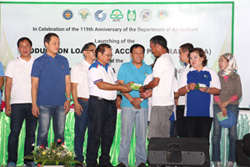The government is beefing-up its effort to alleviate the economic conditions of the farmers and fisherfolks in the countryside.
Agriculture Secretary Emmanuel “Manny” Piñol launched a nationwide credit program for the farmers and fisherfolks dubbed as Production Loan Easy Access (PLEA) Program.
The launching ceremony was held at Malimono, Surigao del Norte some 32 kilometers away from Surigao City on June 26, 2017.

Through PLEA, marginal and small rural farmers and fisherfolks in the area can loan an amount of up to P50,000.00 with no collateral.
Borrowers can pay the loaned amount from 2 to 10 years depending on the commodity or activity with only 6% per annum or 0.5% per month interest rate.
During the launching ceremony, Secretary Piñol awarded to Malimono Multi-Purpose Cooperative an amount of P15 million as lending conduits where borrowers can access the said loan program.
“Our farmers have 3 basic needs which is technology, financing, and marketing, and PLEA is one of the answers to their financial needs,” Piñol said.
The loaned amount is intended to finance any agricultural or fishery production activities covered with insurance through the Philippine Crop Insurance Corporation (PCIC).
However, before a farmer or fisherfolk could access the loan, they shall be enrolled in the Juan Magsasaka’t Mangingisda Database System and issued with an intervention card.
Prior to the launching in Malimono, DA Central Office through the Information and Communications Technology Services (DA-ICTS) conducted a data gathering activity through an interview and geo-tagging the areas to identify the location of their farms and fishing grounds.
“The reason why farmers are hesitant to lend money from the banks is due to numerous documents needed, that is why we simplified the process, once you are registered in our database system and issued with Juan Magsasaka’t Mangingisda Card you are now eligible for the loan program,” Piñol explained.
PLEA with funding support of up to P20 Billion through the Agricultural Credit Policy Council (ACPC) is targeting around 2 million family-beneficiaries across the country. (Aurelius P. Arais/DA Caraga)






